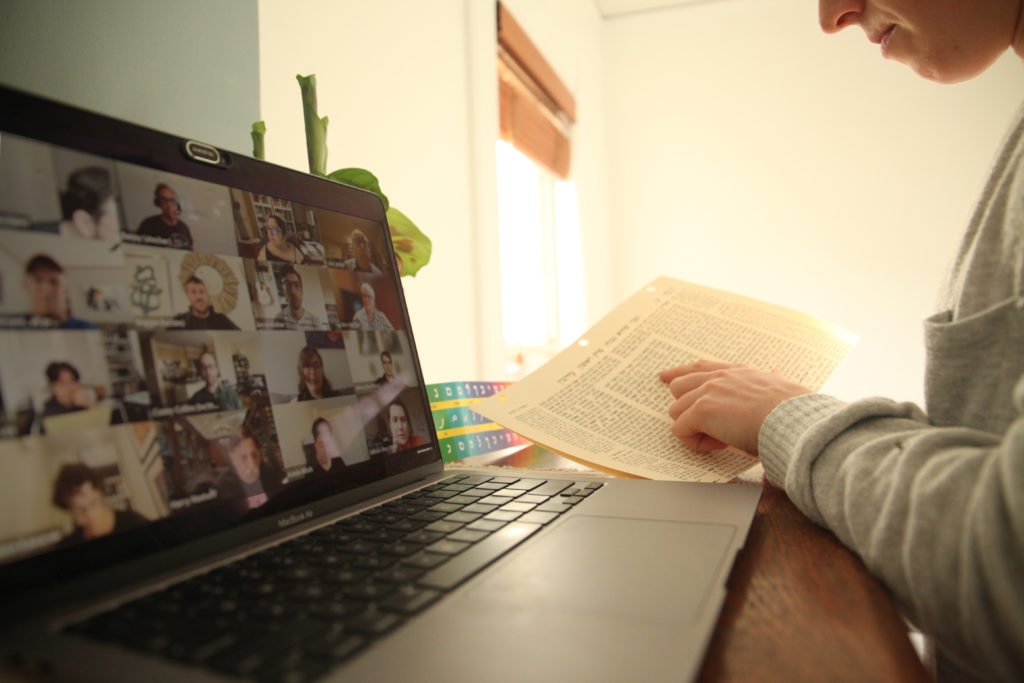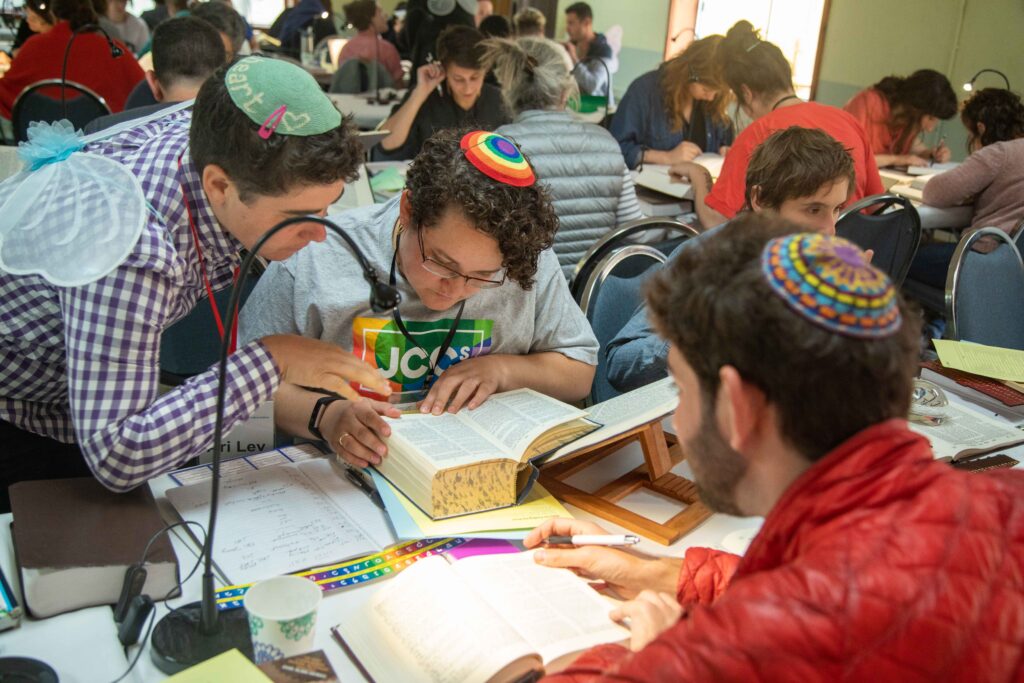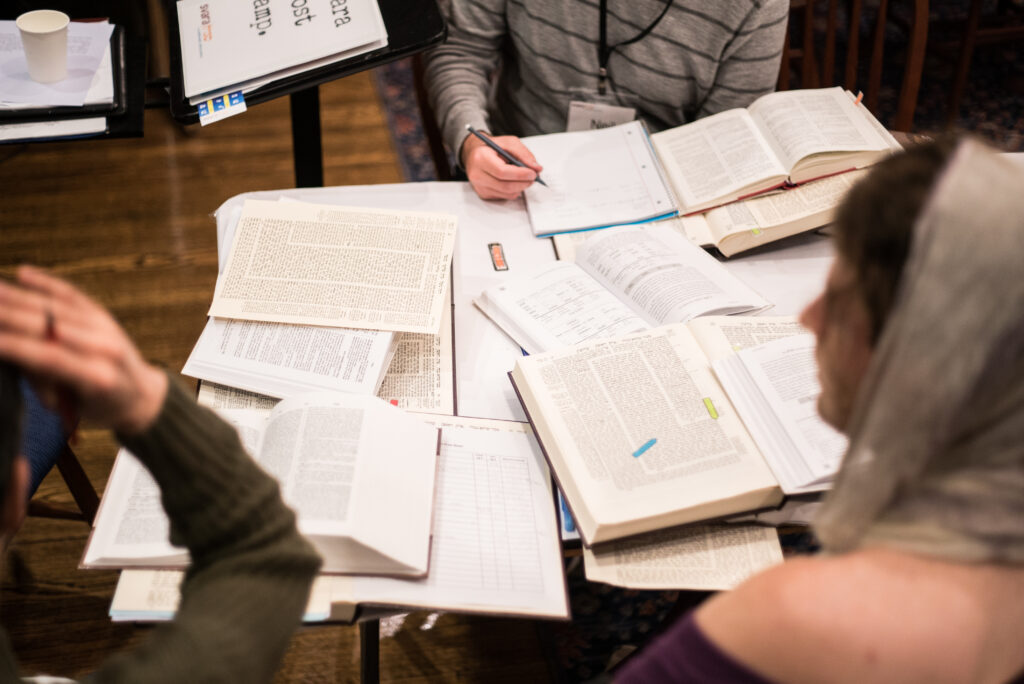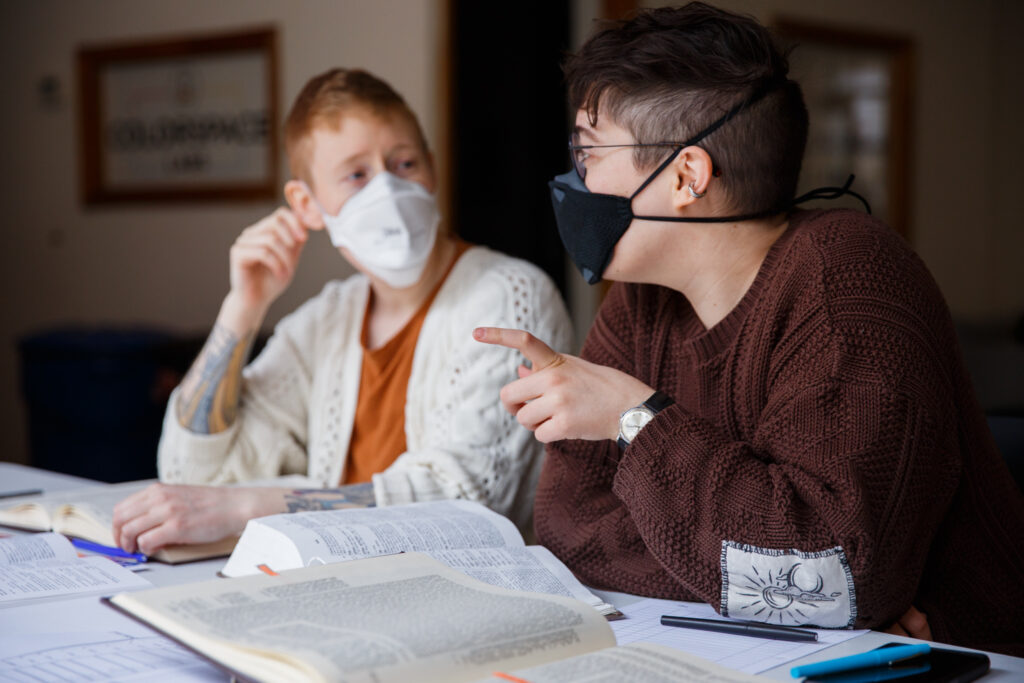When I was 15, about nine months after coming out as a baby trans girl, I found my way to a gathering of queer Jewish teens hosted by Keshet on the other side of the country in southern California. This was my second Keshet shabbaton (weekend gathering) in about two months–I’d gone to my first one two months earlier in Connecticut, and I was so hooked that I was dying to go again. When I arrived at the campsite in California, one of the staff introduced himself to our group: “Hi. I’m Becky Silverstein. I’m a rabbi.”
The notion of a trans rabbi was, to my young brain, shocking. I’d heard about Congregation Bet Simchat Torah in New York and knew that there were (cis) queer rabbis out there. I didn’t know, until that moment, that there were trans rabbis. I don’t remember the rest of the shabbaton, but in that weekend and many more we have spent together since, I am sure I bugged Rabbi Becky with many questions about Judaism, because I finally had someone to ask. Someone to learn from. Someone who knew enough about me and my life to understand what I was asking without me having to explain it.
Almost seven years later, I am blessed to know many trans scholars, rabbis, rabbinical students, and teachers, a group that is steadily growing thanks in no small part to SVARA. I am now a resource for trans teens at Keshet shabbatonim, just as Rabbi Becky was for me. And, this last year, I worked alongside other incredible trans Jewish scholars in creating resources for trans Jews by joining the Teshuva-Writing Collective (TWC) within the Trans Halakha Project. Over the course of several months, we wrote teshuvot (literally, answers), a series of essays, letters, and guides to Jewish practice by trans Jews and for trans Jews. We gathered in groups to fine-tune our projects, to give critique and feedback to one another, to develop an array of resources that will grow the tent of trans Jewish knowledge forever. It was an honor, a privilege, and a joy to join my colleagues, friends, and teachers in this project.
In the coming weeks, SVARA will be sharing our work (stay tuned!). As we edit and put the final tweaks on our teshuvot, I wanted to share a bit of Torah that is sticking with me at this moment.
In Masechet Sukkah (46a), during a conversation about the blessing for the lulav, the Talmud detours into a conversation about Hanukah candles.
ומאי מברך? ״ברוך … אשר קדשנו במצותיו וצונו להדליק נר (של) חנוכה.״
What do we bless [on Hanukah candles]? Blessed… who sanctified us with God’s mitzvot and commanded us to light the candle of hanukah.”
But if you know your Tanakh, you might think–”Where are we commanded to light Hanukah candles? Hanukah is a post-Biblical holiday!” And this is what the Talmud asks:
והיכן צונו? מ״לא תסור״. ורב נחמן בר יצחק אמר: ״שאל אביך ויגדך.״
Where were we commanded [to light]? By “You shall not deviate” (Deut. 17:11). And Rav Nahman Bar Yitzhak said: “Ask your father, and he will tell you” (Deut. 32:7).
The Talmud answers its question by providing two verses that justify the ability of rabbis to make decisions and to create halakhah, Jewish law. The first, which comes from a section about judges, is more commonly cited and, for now, less interesting to me. I want to examine Rav Nahman’s justification. This comes from Ha’azinu, a poem recited by Moshe to the people just prior to his death. The full verse is:
זכר ימות עולם בינו שנות דר־ודר שאל אביך ויגדך זקניך ויאמרו לך
Remember the days of old, consider the years of ages past;
Ask your father, and he will tell you; your elders, and they will say to you (Deut. 32:7).
In classic Talmudic fashion, the text of the Talmud actually leaves out the relevant part of the verse. Rav Nahman bases rabbinic authority on the last line, replacing the elders with the rabbis. For the rabbis, the Biblical “elders” does not mean merely “old people,” but rather a group of appointed communal leaders, as in Avot 1, so the idea that the rabbis are now the elders of the community is not a stretch. But in placing rabbinic authority in this verse, Rav Nahman also introduces fathers, or more generally, the chosen families around us, as sources of authority. So, in this reckoning, Jewish practice, knowledge, and halakhah comes both from the people around us and the communal authorities, often in the form of written text. We learn Judaism through the lessons, practices, and customs (minhag) of our communities and families as well as from the words of the elders, the written down, by-the-book, text-based Judaism.
But as a trans Jew who cares very deeply about Jewish practice, this verse feels especially challenging. When I first came out as trans, I didn’t have any texts, any elders, any family to guide me. I had no one to ask. I was fortunate enough to find those things as I grew, particularly through the Keshet Shabbatonim, but being in any trans Jewish space is a constant barrage of, “how do I make Jewish ritual and halakhah work for me?” How do I find the communities, the practices, the texts, the wisdom, to bring my whole self into Judaism and halakhic practice? There are Facebook threads and Google docs, oral answers repeated like broken telephones, and individually-created rituals kept in small communities. There are a few bits and pieces out there on transtorah.org and in a brilliant teshuvah on taharah for trans people who pass away.
But these are just not enough. There are only a few elders to ask, and almost no texts for them to lean on. We might be lucky enough to have the chosen families to show us what trans Jewish practice can look like, but we have had almost no books to ask, no opportunities to consult our elders.
This is why the Trans Halakha Project is so radical and so crucial. I was honored with the privilege of joining the Teshuvah Writing Collective, to address the gap in by-the-book knowledge and halakhic works that exists for trans Jews. I joined a cohort with a variety of approaches to halakhah to create new ways, ideas, and practices for being trans and Jewish. Some of us tackled big topics, like whether or not there was a Jewish obligation to transition. Others covered questions like the disposal of tissue after gender affirming surgery. I, along with many others, chose to write about circumcision (brit milah) and menstruation (niddah), two gendered and sexed rituals that are often incredibly challenging for trans people.
My goal in my teshuvah was to use the androgynos (אנדרוגינוס), a rabbinic sex category that exists between male and female, to understand how trans Jews might fit into halakhah. When the rabbis wrote about the androgynos, “they did not consider [them] as external to the system they crafted. Hence, [androgynos are] not only human, but also Jews” (Charlotte Fonrobert, “Regulating the Human Body” in The Human Body in Rabbinic Legal Discourse, 289). Two thousand years ago, the rabbis insisted that the androgynos fit into halakhah. In 2023, I wanted to use the androgynos and the rulings around them to insist that trans Jews do too, and that we can make halakhah for trans people based on precedent, rather than just cutting and pasting trans people into halakhah made for cis people.
This was but one approach among many. I looked at the Talmud and halakhic codes to guide me; others looked to kabbalah, to philosophy, to secular wisdom, and to the lived experiences of trans Jews. I felt that, even if my svara guided me to a slightly different answer, I was accountable to the rulings and decisions of generations of rabbis before me; others let their svara guide them to create something radical, exciting, and new. Part of the beauty of the TWC is that we all have different backgrounds, approaches, and perspectives, that in some way, we try to reflect the broadness in our communities. I believe that, no matter where a trans Jew may fall in the Jewish spectrum, they will find something exciting and joyful in the incredible work of the TWC, and that future gatherings and collectives will produce more trans halakhah that holds all of our community in place.
When the work of the Teshuvah Writing Collective and the Trans Halakhah Project is published, when we put our work into the world, I believe that Moshe’s prophecy will finally come true for trans people. We will be able to ask our elders, and they will be able to tell us: this is for you.







